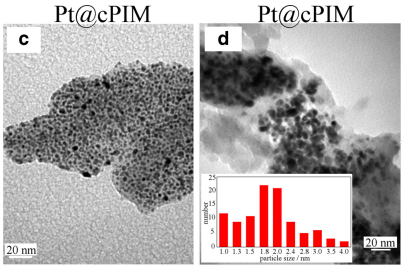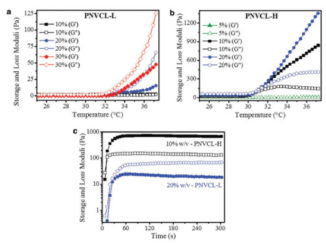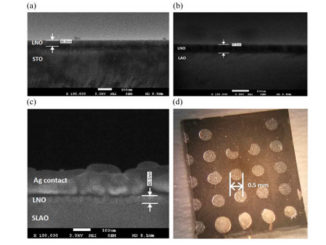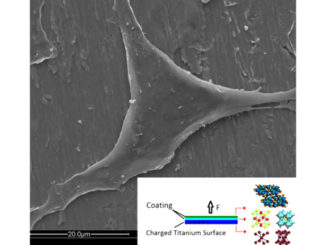
High-Utilisation Nanoplatinum Catalyst (Pt@cPIM) Obtained via Vacuum Carbonisation in a Molecularly Rigid Polymer of Intrinsic Microporosity
Abstract: Polymers of intrinsic microporosity (PIM or here PIM-EA-TB) offer a highly rigid host environment into which hexachloroplatinate(IV) anions are readily adsorbed and vacuumcarbonised (at 500 degrees C) to form active embedded platinum nanoparticles. This process is characterised by electron and optical microscopy, atomic force microscopy (AFM), X-ray photoelectron spectroscopy (XPS) and electrochemical methods, which reveal that the PIM microporosity facilitates the assembly of nanoparticles of typically 1.0 to 2.5-nm diameter. It is demonstrated that the resulting carbonised “Pt@cPIM” from drop-cast films of ca. 550-nm average thickness, when prepared on tin-doped indium oxide (ITO), contain not only fully encapsulated but also fully active platinum nanoparticles in an electrically conducting heterocarbon host. Alternatively, for thinner films (50-250 nm) prepared by spin coating, the particles become more exposed due to additional loss of the carbon host. In contrast to catalyst materials prepared by vacuum-thermolysed hexachloroplatinate(IV) precursor, the platinum nanoparticles within Pt@cPIM retain high surface area, electrochemical activity and high catalyst efficiency due to the molecular rigidity of the host. Data are presented for oxygen reduction, methanol oxidation and glucose oxidation, and in all cases, the high catalyst surface area is linked to excellent catalyst utilisation. Robust transparent platinum-coated electrodes are obtained with reactivity equivalent to bare platinum but with only 1 mu g Pt cm(-2) (i.e. similar to 100% active Pt nanoparticle surface is maintained in the carbonised microporous host).
Author(s): Rong, YY; He, DP; Malpass-Evans, R; Carta, M; McKeown, NB; Gromboni, MF; Mascaro, LH; Nelson, GW; Foord, JS; Holdway, P
ELECTROCATALYSIS
Volume: 8 Pages: 132-143 Published: MAR 2017
DOI: 10.1007/s12678-016-0347-5




